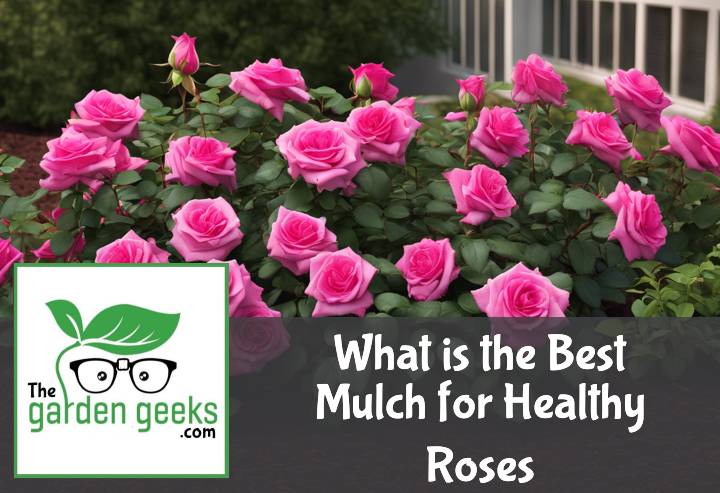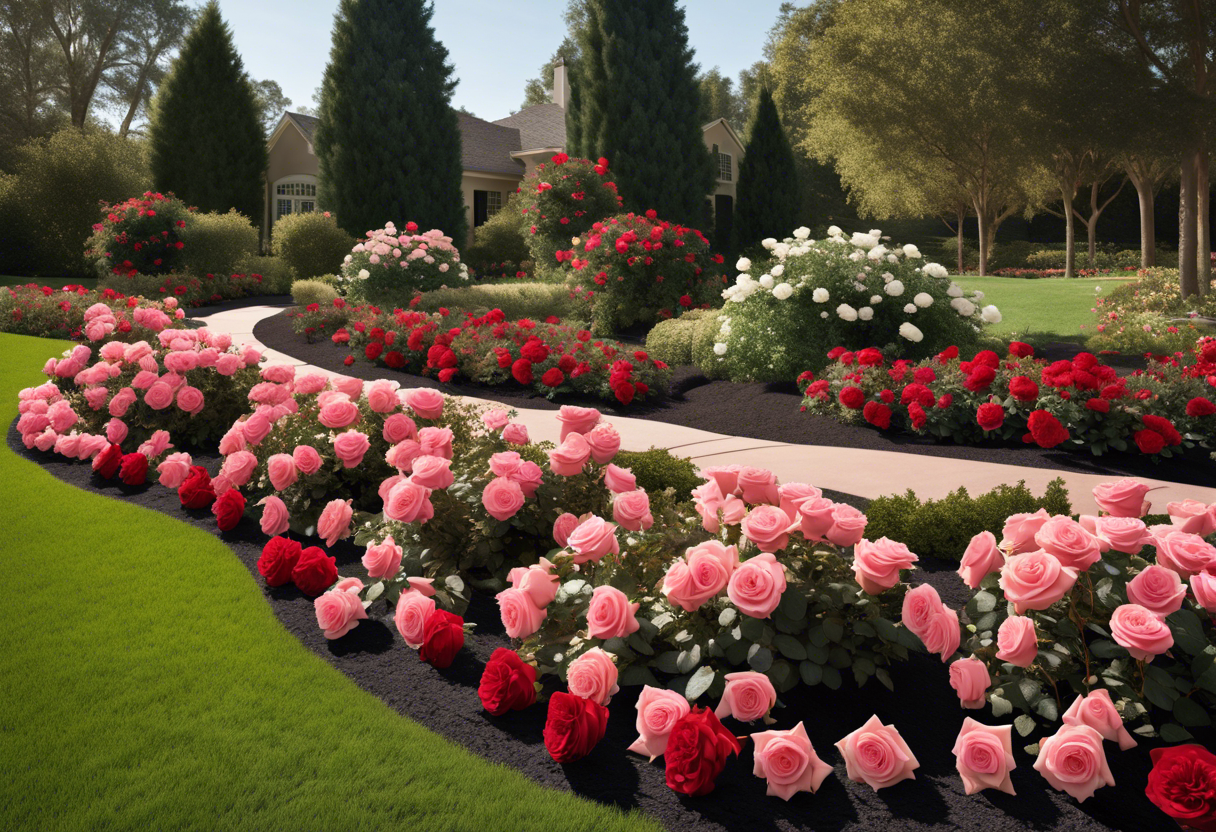Ever found yourself in the garden, staring at your roses and wondering how to make them healthier and more vibrant? Well, I’ve been there too. And let me tell you, it’s all about the mulch! The Best Mulch for Healthy Roses can be a game-changer.
The magic lies in choosing the right kind of mulch and using it correctly. It’s like finding the perfect pair of shoes – not only do they need to look good, but they also have to fit just right. So buckle up, fellow rose enthusiasts! We’re about to embark on a journey into the world of mulching. Keep reading about ‘What is the Best Mulch for Healthy Roses?’
Key Takeaways
- The best mulch for roses is organic mulch, specifically composted bark, pine needles, or shredded leaves.
- These types of mulch improve soil structure and fertility as they decompose.
- Mulching helps retain soil moisture, suppress weeds, and maintain a stable soil temperature.
- Apply 2 to 3 inches of mulch around the base of the rose bushes but avoid direct contact with the stems to prevent rot.
Understanding Mulch and Its Importance for Roses
Let’s talk mulch basics. So, what is mulch? And why does it matter in rose gardening?
What is Mulch?
Mulch, my dear friend, is like a superhero cape for your garden soil. It’s a layer of material you spread over the soil surface. The purpose? To protect and improve the soil underneath.
It can be organic stuff like compost or bark chips, or inorganic like gravel or plastic sheets. Each type of mulch has its own pros and cons, but that’s a story for another day.
Why is Mulch Important for Roses?
Now let’s get to the juicy part – why we’re all here: the importance of mulch for our beloved roses.
Roses are divas; they love attention and care. Mulching helps keep them happy by retaining moisture in the soil – no more dry spells for your roses! It also regulates soil temperature, keeping those roots nice and comfy throughout the year.
But wait, there’s more! Mulching also suppresses weeds that might compete with your roses for nutrients. So yes, mulching does give you the best mulch for healthy roses!
Types of Mulch Suitable for Roses
When it comes to rose gardening, the best mulch for roses can be categorized into two main types – organic and inorganic. Each has its own set of pros and cons that can affect your rose care routine.
Organic Mulches
Let’s start with organic mulches. These are your natural buddies, made from plant or animal matter. They’re like the superheroes of the mulch world, offering a host of benefits to your roses. We’ve got three main types here – bark and wood chips, compost, and straw or hay.
Bark and Wood Chips
First up is bark and wood chips. This type of organic mulch is like the bodyguard for your roses. It helps retain moisture, keeps weeds at bay, and slowly decomposes to enrich the soil. But remember, too much of anything isn’t good – excessive use might deplete nitrogen levels in the soil.
Compost
Next on our list is compost. Using compost as mulch is like giving your roses a gourmet meal! It enriches the soil with nutrients and improves its structure. However, it decomposes quickly so you might need to replenish it more often.
Straw or Hay
Lastly, we have straw or hay as an organic mulching option for roses. It’s pretty similar to using bark or wood chips but tends to break down faster. On the downside, it might attract pests if not properly managed.
Inorganic Mulches
Moving on to inorganic mulches for roses, these are typically man-made materials or minerals that don’t decompose easily. They include stone or gravel and plastic or landscape fabric.
Stone or Gravel
Stone or gravel can be used as an inorganic mulch for roses. It’s great at conserving moisture and controlling weeds but doesn’t contribute any nutrients to the soil over time.
Plastic or Landscape Fabric
Finally, we have plastic or landscape fabric. This type of mulch is like a protective barrier for your roses, preventing weed growth and retaining moisture. However, it doesn’t allow water and air to penetrate easily which can affect soil health.
Factors to Consider When Choosing the Best Mulch for Roses
When it comes to picking the best mulch for roses, it’s not a one-size-fits-all scenario. You’ve got to consider factors like soil type, pH level, climate conditions, and even the rose variety itself.
Soil Type and pH Level
The soil type for roses plays a significant role in your mulch selection. For instance, sandy soils might need a heavier mulch to prevent erosion. On the other hand, clay soils would benefit from lighter mulches that allow better air circulation.
Now let’s talk about pH levels. Roses prefer slightly acidic soil, so if you’re dealing with alkaline soil, an organic mulch like pine needles could help lower the pH level. But remember folks, too much acidity isn’t good either!
Climate and Weather Conditions
Climate also has its say in the choice of mulch. In colder climates, a thicker layer of mulch can protect roses from harsh winter conditions.
However, if you’re living in a hot and dry area, light-colored mulches are your best bet as they reflect sunlight and keep the soil cool. So yes folks, weather does dictate what kind of blanket your roses need!
Rose Variety
Lastly but definitely not leastly (is that even a word?), we have rose varieties. Different types of roses may have different mulching needs.
For example, hybrid tea roses love organic matter-rich compost while climbing roses might prefer wood chips or bark. So remember folks – when choosing the best mulch for healthy roses, always consider their individual tastes!
How to Apply Mulch to Rose Beds Properly
When it comes to rose bed mulching, doing it right is just as important as picking the best mulch for healthy roses. Proper mulching techniques can make a world of difference in rose care with mulch.
When to Apply Mulch
Timing is everything, folks! The best time to mulch roses is typically early spring or late fall. Why? Well, seasonal rose mulching helps insulate the soil and protect your precious blooms from temperature extremes. Timing of rose bed mulching also plays a role in weed control. So, don’t snooze on this one!
Correct Method of Applying Mulch
Alrighty then, let’s talk about how you should be applying that lovely pile of mulch. Mulching techniques for roses aren’t rocket science, but they do require some attention. Start by spreading an even layer around the base of your roses – not too thick though! We’re aiming for 2-3 inches deep here. This proper application of rose bed mulch ensures that water can still reach the roots while keeping those pesky weeds at bay. Remember, distributing the mulch evenly is key!
Common Mistakes in Using Mulch for Roses and How to Avoid Them
Alright, let’s talk about some common mulching mistakes that can turn your rose care into a nightmare. The two main culprits? Over-mulching and using the wrong mulch type. But don’t fret, we’re here to help you get those healthy roses back on track!
Over-Mulching
Over-mulching roses is like overfeeding a pet – it does more harm than good. It can lead to waterlogging and suffocate the roots, harming your rose health. So how do you avoid this mulching faux pas? Simple! Just keep an eye on the mulch layer – if it’s thicker than 3 inches, you’re in the danger zone of over-mulching. Remember, moderation is key when it comes to mulch application.
Using the Wrong Type of Mulch
Now onto another common goof-up: using improper mulches for roses. Not all mulches are created equal, folks! Some can alter soil pH or attract pests – definitely not what you want for your roses. So what’s the solution? Choose the best rose mulches, ones that are organic and well-rotted. They’ll provide nutrients while maintaining soil moisture levels – just what the doctor ordered for optimal rose growth!
To Wrap Up
It’s been a wild ride, hasn’t it? Just like finding the perfect dance partner, choosing the Best Mulch for Healthy Roses can be tricky but oh-so-rewarding.
Remember, folks, roses are not just pretty faces; they need love and care too. So go ahead, show them some mulch-love!





